#also. i drew everything based on memory so if anything you see here is incorrect... no it isn't.
Explore tagged Tumblr posts
Text
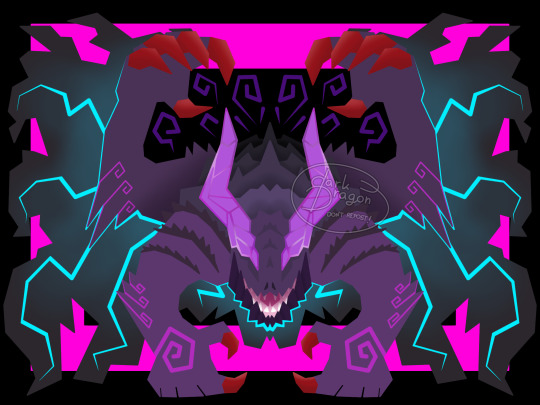
Gore Magala my beloved
#woo dragons art be upon you#monster hunter#monhun#gore magala#monster hunter 4#monster hunter 4 ultimate#i really like how the horns turned out. it was some spontaneous idea to give it this flow glow effect but it worked. pretty well even!#i drew those swirls on the arms cuz they were pretty empty and I didn't know what else to put there#also. i drew everything based on memory so if anything you see here is incorrect... no it isn't.
120 notes
·
View notes
Text
Reacting to The Good Place: “Dance Dance Resolution”
Eleanor’s Moral Continuity

The Setup: Find our reaction to the season 2 premiere of The Good Place here.
SPOILERS for episode 203 below!
KRIS:
Well, that escalated quickly. (Said the guy who’s never seen Anchorman.) In The Good Place’s Chapter 16 — written by noted pun enthusiast Megan Amram (also on Tumblr) and directed by executive producer Drew Goddard (a Lost alum and excellent writer in his own right, who ran the first half of the first season of Daredevil and wrote the screen adaptation of The Martian) — Adam’s prediction about an alliance proves largely correct, Liz’s and my theory that Eleanor was actually retaining her ethical/spiritual growth proves (sadly) incorrect, and Eleanor and Chidi are confirmed as soulmates, even if Michael didn’t know it. PLUS: the returns of lava demon Todd, the Medium Place, and — thank you, universe — Janet’s reset button!
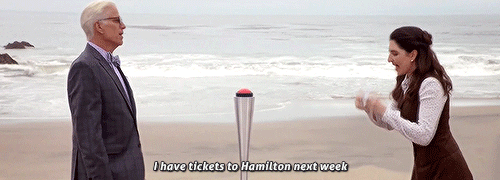
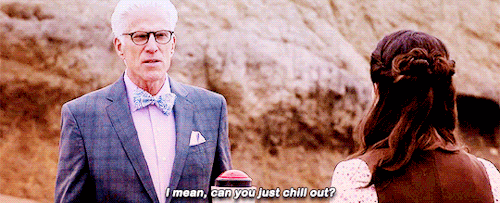
“Is that possible, Janet? Can you just chill out a little?”
“Dance Dance Resolution” goes Groundhog Day (I haven’t seen that, either, but I have seen the terrific Edge of Tomorrow) with an accelerated/abbreviated chronicling of Michael’s hundreds of attempts to engineer a perpetual torture machine that Eleanor won’t far-too-quickly outsmart. He hits rock bottom when the epically stupid Jason solves it first (“Yeah, this one hurts”). Eventually, when all the other demons go on strike and Vicky (f.k.a. Real Eleanor) brings him a list of their demands, Michael finds himself reduced to seeking advice from a man who died because he locked himself in a safe and thought he could still breathe because he brought a snorkel.
Meanwhile, in what might actually be the episode’s B-story (how did the rest of you read it?), Eleanor and Chidi overhear the truth from some of the striking demons on a smoke break, and flee to the Medium Place, where Mindy St. Claire is really tired of Eleanor and Janet showing up on her doorstep with various combinations of the other doomed souls. We get good gags out of Mindy being the only one who remembers any of the 14 previous visits, and hear a few of Eleanor and Co.’s failed plans to outmaneuver Michael. But this episode’s emotional power comes from Mindy’s revelation that Eleanor and Chidi have not only slept together several times, but once even confessed their love to each other. (“It’s like anti-porn.”) Shaken, Eleanor — who has just been really mean to Chidi, even for her — rallies the team for the 700-somethingth time (we see some versions where Michael gives up after just a few seconds) and delivers an ultimatum to Michael… but thanks to that aforementioned advice from Jason, he’s (still) one step ahead of them. He wants to team up. This seems to mean that Tiya Sircar’s Vicky has just become our season villain, which is a pretty glorious reversal of the dynamic she originally had with “Fake Eleanor.”
Surprising no one, I’m now even more invested in learning more about Janet, who is clearly so essential to the operation of afterlife neighborhoods that even through 801 resets Michael could never fully control her. (Does this mean that in “Tahani Al-Jamil,” Janet’s wild personality swings were also to some degree unintentional? I’d love that. They weren’t essential to making Chidi despair over the awfulness of his book and pushing him out of his comfort zone.)
Anyone have hopes, fears, favorite moments (I think I can guess one of Liz’s), or a lead on some coke for poor Mindy St. Claire? As a former fledgling Nietzsche scholar, I’m pretty happy that William Jackson Harper delivers what I’m convinced is only the third or fourth time an American TV show has correctly pronounced “Nietzsche.”
Click through for sports analogies from Adam, a philosophy digression from Kris, and a quality Twitter recommendation from Miri:
MIRI:
Well I’m officially done trying to predict The Good Place. (This is a lie, and I’m not even sorry. Feel free to mock me for how wrong I am in future.) We knew they would twist us again soon, but not this big this quickly. Damn, Schur & co. Just damn.
I have questions about Janet’s level of self-awareness. Or I guess accumulation/memory of previous resets? Her conversation with Michael as he’s about to reset her suggests she knows somewhat what has happened in the past. That may be due to him explaining it to her over the course of that attempt, but I’m not sure. Does Janet have the capacity to retain change even if she loses memories? Clearly Eleanor and co can, but Janet is not human. But is she a being? Does she have the ability to grow? (Sidebar: Perpetually in love with D’Arcy Carden’s performance. That sequence of falls!)
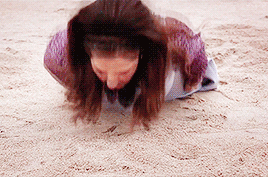
I genuinely love The Good Place’s relationship to absurdity. When you run 800+ scenarios, you’re going to get to some weird places and a two second farm reality joke is exactly what I never knew I needed from a tv show. They have a damn clam chowder fountain, which is insane but they play it as if it isn’t and that is what works so beautifully. Everything they’re doing is bonkers, but if enough people do the same bonkers thing with a straight face, it’s very hard to question it. That’s what worked in the demons’ favor in the first season, and I think what will work in Eleanor, Michael, etc.’s favor this time around. (I told you I was lying about the no predictions thing.)
Jumping back to the chowder fountain for a moment: Manhattan clam chowder would be more demonic to have around than New England clam chowder in general, but a (proper) dairy based chowder is more horrifying to have in a public fountain, so I believe they made the right call on that.
A few smaller thoughts to wrap up:
JUST realized that Mike Schur and Michael the demon have the same name and I don’t know what that says about Schur or about what Shur thinks of himself. It’s a good name in general, though.
I’m quite excited to see more from Vicky. She’s a really volatile mixture of blind enthusiasm and legitimate shrewdness, plus Sircar is just a joy to watch.
How high is the demon to bad person ratio, y’all? Is it really this skewed or is this a gross misallocation of resources?
Highly recommend this delightful twitter
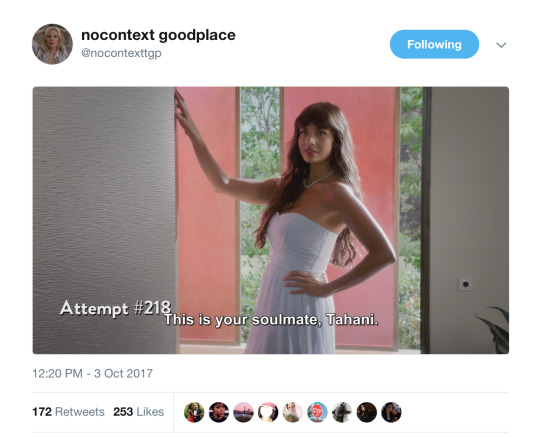
ADAM:
A slight disclaimer: I have been a little busy with the move and without internet living like some early 90s sap. I'm currently at my local Starbucks writing this (Spectrum hooks everything up later today). Now back to the show.
It's hard God Damn work being this right all the time! I mean I figured that the team up storyline would happen later, but well played Mike Schur for just getting to the point (more on that in a minute). I watched the episode at a Holiday Inn Express in Kingman, AZ and I'm pretty sure Kris could hear me patting myself on the back from his apartment in Hollywood. It is a good feeling when you just nail a plot development or future storyline. I mean some could liken my figuring out the plot twist to Jason figuring out that everyone is was in the bad place. Okay, enough of the gloating time for more serious talks because I've got great news for everyone, especially Mindy St. Claire, I didn't forget the cocaine!
I will say that even though I called the team up angle, I did not expect it to happen at the end of episode two. The Michael storyline of nothing working and being blackmailed by fake Eleanor (or whatever you want to call her) did have a mid-season or end of the season storyline to it. After letting everything settle in now, however, it makes sense that Schur would pull something like this-this early on. If you look back to the end of season 6, and all of season 7, of Parks and Recreation he takes massive time jumps. Leslie had triplets and we never saw them except for short moments. He essentially did the same thing with “Dance Dance Resolution.” He showed that we can keep doing the same thing over and over again (ala case of the week) seeing how everyone figures it out. In a recent podcast interview he did with Andy Greenwald, he explained how he likes to dig himself a hole and figure a way out. This episode shows that he's crazy like a fox and like "The Good/Bad Place" anything is possible to happen. I like the fact that with this Groundhog Day kind of episode that Schur and Co. are saying that no matter the different variables that the outcome is the same. Ergo, even though these might be bad people they can still learn and grow to be good. Which then leads to the question of: What really makes a bad/good person? Kris, since you are the philosopher I look to you to answer that question. I will say that with the team up now happening that Eleanor and Co. will grow attached to Michael and vice versa (a bit of a stretch).
Disclaimer: This portion is going to be heavy with sports analogies.
Eleanor, Chidi, and Janet have some very funny moments in this episode showing that they are getting more freedom to handle more of the comedy on their own (I touched on this last episode). The episode, however, truly belonged to Michael. “Dance Dance Resolution” felt like Ted Danson was playing iso ball. We never really truly got to see him shine, except only during last season's finale. This was his moment and he did not disappoint. He was essentially LeBron barreling down the lane where no one is going to stop him. His ability to set others up (his interactions with Janet and then Jason in particular) so they get their moment is great. How he can work in the scene is great and his comedic timing is on point that it just seems so effortless. I am curious to know how much direction is given to Ted Danson or if it's just give him the ball and get the hell out of his way.
I would say to Kris and Liz that you are both correct that Eleanor keeps her ethical and spiritual growth. The reason is that even though yes she does lose her memory every time there is a reset, if you look at every reset she still does the same thing. She seeks out Chidi for spiritual/ethical growth. While she may not remember what happens she always tries to do the responsible or ethical thing. The question may be that instead of wondering what Janet retains with every reset, we might want to start asking what Eleanor and Co. retain with every reset. The characters’ memories are wiped, but how much are they truly retaining? Even when Eleanor and Chidi visit Mindy St. Claire for the 50th or whatever time, she explains to Eleanor that that is the first time Eleanor has told Chidi that she loves him. Even though they have had sex dozens of times before she never said told Chidi that she loved him. That would mean that even though their memories keep being erased their connection continues to grow stronger. This is going to be a storyline that Eleanor and Chidi are going to continue to grapple with throughout the show because with them trying to fool everyone Eleanor and/or Chidi is going to get jealous (or try to make the other jealous) while they are with their "soulmates." I mean let's be real it will be Eleanor trying to make Chidi jealous by hooking up with her "soulmate" and Chidi trying to get back at her, but failing in a miserable yet funny way. I really hope they stay away from a Will They Won't They sexual tension between Chidi and Eleanor.
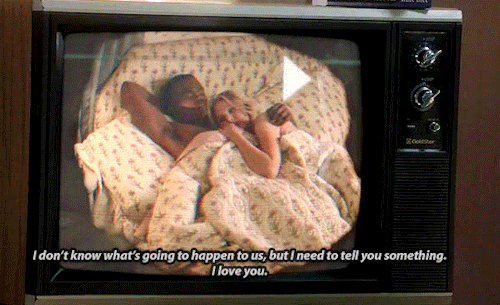
Finally, I would have to disagree with the notion of Janet knowing and or retaining information. I think that Janet is just an actual computer trying to understand how the world works. I think that with every reboot I would compare it to a hard reset if someone formatted their computer. In the season one finale Michael says they stole a good Janet and reprogrammed her. She may have a backup drive that Michael does not even know about, which then, said backup drive will eventually be used against him by Shawn to retire Michael. I would also like to see Tahani get some more run. She hasn't had as much space to play as the rest of the co-stars. She has mainly just been involved in the B, sometimes C plot or the occasional runner.
KRIS:
Since now two of you have asked, my leanings as a former-almost-philosopher are Aristotelian, which is to say that A) I’m generally more interested in character traits — virtues and vices — than in hard universal rules or in what you could call the “moral math” of utilitarianism/consequentialism; and B) I tend to think one’s character is shaped by one’s actions (as Chidi has explained to Eleanor), and that therefore one’s moral sense can be — indeed, must be — trained. As my existentialism professor Iain Thomson once phrased this view, “Aretē is a technē. Virtue is a skill.” (The Greek root of the word “technology” is “technē,” which can translate roughly to “skill,” but also to “science,” or even to “art” in the sense that (an) art is a practice. Which is why the website name Ars Technica is a little strange.)
Virtue ethics, then, may be the main ethic of The Good Place as a show. It’s worth nothing, though, that in “Dance Dance Resolution,” Chidi for the first time identifies himself as a specialist not in virtue ethics but in deontology, i.e., ethics based on rules and duties. (This explains his interest in contractualism and Scanlon’s What We Owe to Each Other, and also why he was so excited to have meals with Immanuel Kant.)
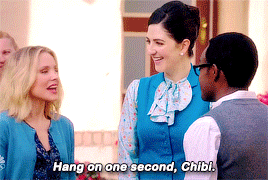
Appropriate response to a Kant superfan I’M KIDDING (mostly)
I’m not yet totally sold on Adam’s read of what I’m going to call Eleanor’s moral continuity, but I like it. (I literally applauded alone in my studio apartment when Adam’s prediction came true.) This brings me to my biggest… I don’t know if “concern” is the right word? But like I said last week, I’ll miss watching Eleanor grapple with her past dirtbaggery, which wasn’t just hilarious but often moving, and often a mirror. Think of when Eleanor’s boyfriend wanted to boycott that coffee shop. Dirtbag-Eleanor decided that because perfectly aligning all of one’s actions with one’s principles is impossible, we shouldn’t bother trying. As a specific scenario, this is something we all struggle with. And in general, the theme of “How Do I Be(come) a Good Person?” is creepy-targeted-Facebook-ads-level Pandering to Kris.
Vox’s Caroline Framke observed that this season reminds her of how Community changed a lot in its second season, shifting from a show “about college” to something supremely strange and toweringly ambitious, all for the better. I definitely don’t object to The Good Place undergoing a similar change, as seems to be the case not only in this episode’s structural ambition but in the increased focus on Danson/Michael. But while I do love Danson (who is everything Adam says he is), maybe because this is actually the first thing I’ve seen him in, I’m less invested in TGP as a Danson Delivery Mechanism than I was in its being — by circumstance if not by design — a show about women and people of color trying to find (or make) their place in the universe.
More importantly, the increased Michael focus is also what signals that TGP is no longer primarily about being a good person — though the team-up suggests it may still be about building a good community. And that’s a Schurian theme I love, partly because it’s an antidote to the distinctly American ethos of radical individualism: Americans like to believe in superheroes, in the Great Man theory of history, in “pulling yourself up by your bootstraps” as the answer to everything, in the power of a single person to change the world through sheer will. But that’s not how the world works. It takes a village. This is indeed the point of Aristotle’s ethics, and of Aristotle’s Ethics, by which I mean the book Nicomachean Ethics, whose last chapter all but explicitly sets up his Politics, a work about how we organize communities to serve the ends of human happiness. An old classmate thought it was insane that political theory students read the Politics without necessarily reading the Ethics, and something like the reverse is also true: the goals established in the Ethics cannot be achieved without politics.
In The Good Place, Eleanor can’t become better if the world around her doesn’t provide conditions that make striving for goodness feasible. A key idea in philosophical ethics is that “ought implies can.” If a moral framework is going to make sense as a human project, and as something that can be enforced, following it has to actually be possible. In life this is what discouraged Eleanor from even trying to be conscientious about how she spent her money, and in afterlife it’s what Chidi agonizes over when Mindy reveals they’ve all been here before: “We are experiencing karma, but we can't learn from our mistakes, because our memories keep getting erased. It’s an epistemological nightmare!”
(For a much cleaner, sharper take on where this may all be going in a larger thematic sense, read Todd VanDerWerff on how he sees The Good Place as a self-conscious repudiation of Parks and Recreation’s optimism.)
ADAM:
I think TGP is still about being a good person though. While yes there is a team up there still is the suggestion about what characters, mainly Eleanor, will do to figure out how they are good. Everything Schur has created deals with the optimism within not just people, but a community as a whole. This optimism is then brought forth by a conduit (Leslie Knope in Parks and Rec, Terry Jeffords in Brooklyn Nine-Nine) that shows everyone around them that they can either make a difference or can learn to be less selfish.

Do you think that because Eleanor might retain some sort of "Goodness" that she then tries to make the neighborhood good? Do you think the Eleanor does retain some of the goodness that she has learned from all the resets (hence my theory on her telling Chidi that she loves him for the first time) that she, in fact, will help both Michael and the rest of the neighborhood become good? I don't see TGP as a repudiation to Parks and Rec's optimism, I see it as the optimism shining through the chaos within. Not to belabor the point, but even after all the 800+ resets Eleanor always seeks Chidi out to learn ethics/morality, as she feels guilty that she is not supposed to be in the "Good Place." She never deviates or goes down a different path. Couldn't you say that even in the chaos as a whole Eleanor and Co. still show resolve and that good can still shine through all through the chaos?
KRIS:
I'd like Lemon and/or Miri to take a crack at these questions, and I'll maybe come back to Eleanor when I close this out tomorrow morning, but I'll venture briefly that there's a distinction between the optimism of Parks -- Change for the better is inevitable, we're on the winning side of history -- and the specific, America-in-2017 brand of hope (or maybe that's not even the right word, but something hope-adjacent) that can be read into TGP, in which you try to change things for the better without assuming that you're going to succeed. In the case of Eleanor and Co., it's not like it can get any worse; there's nowhere to go but up, and thus nothing to lose by fighting even an unwinnable battle, but there is a toll on the conscience for giving up.
MIRI:
Point of clarification (because it matters to the questions Adam brought up, not just because I'm a pedantic ass)—I'm pretty sure this was not the time Eleanor said she loved Chidi. Mindy was showing her tape of another time. They overheard the striking demons only a few days into this reset, so they barely know each other this time. Which is why Eleanor was horrified to learn of the love—she doesn't feel that way about Chidi. Yet. And I think that goes to an important point—Eleanor's progress is not a straight line. She's evolved as a person overall, but she's still somewhat who she used to be and has her old memories. The circumstances of each reboot affect how she reacts somewhat. And that's realistic—no path to self improvement is simple or linear. She's going to have backslides and incremental progress. (Also I'd argue that she goes to Janet for help staying under the radar for her own safety and Janet brings her to Chidi. Eleanor doesn't go directly to him out of love or guilt. BUT she does find her way to him and is willing to learn from him over and over and over, which is what matters to me.)
I think that Eleanor's character has improved and that she retains some of that, but that the job is far from done—and that is the most important part. Each time she must choose to do better (not for the best reason to start, but still) and then work at it. Being good in a vacuum is easy and not particularly worthy of commendation. Eleanor is still on her climb out of dirtbaggery, she's just a bit farther along than in the first season.
Also: IT DID NOT OCCUR TO ME until Kris pointed it out that literally none of the non-demon protagonists are white dudes. That's amazing. I have come to expect Fremulon shows to actually look like the world (women, people of color, many things are garbage but not ALL things, etc). But damn, that is worth taking a moment to appreciate.
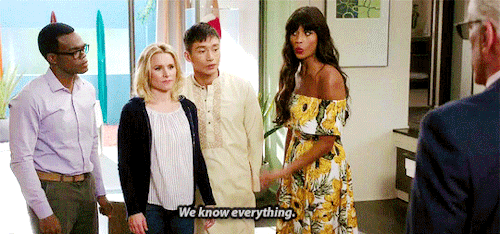
Also also, I would like to [again] direct you all to the twitter @nocontexttgp because it is a damn delight on my twitter feed and we all deserve that.
KRIS:
I wonder how much we should consider the question of Eleanor's moral continuity in the light of the sitcom "law" that your characters can't really change. Mike Schur and his collaborators (Dan Goor on B99, Greg Daniels on Parks) have pushed this law to its limits, but have they ever really broken it? Jake Peralta has grown up enough to be a worthy partner to Amy Santiago, but he's still definitely recognizably the Peralta of the pilot. Even the increasingly Woke Peralta is seen in season 1, when he punches out guest star Stacy Keach's old school detective for being homophobic. Leslie Knope started out kind of as a hapless Michael Scott clone, but she was never as outright awful a human being, and Poehler's sunniness lent itself to a different direction, so that Leslie became a hypercompetent moral authority, but she also retained her Too Much-ness and her blind love for and faith in her friends.
From the beginning Schur has been clear that The Good Place is intended as a heavily serialized show, so Miri's observation that Eleanor and Chidi seem to flee to the Medium Place relatively early into version 802 gets at a big question I have that this week's inevitable twist will probably prove I'm overthinking BUT STILL: Are we supposed to assume that Eleanor v802 has had roughly the same amount of moral maturation as version 1, that she’s had roughly similar experiences to what we saw last year? It seems like we have to say no, right? And if that's the case, this is on one level a pretty interesting commentary about network sitcoms: in a way it really doesn’t matter what happens to these people week-to-week, as it really didn't matter exactly who Joey was dating or exactly what Monica was yelling about on any given episode of Friends. But more specifically to the serialization of The Good Place, who/what exactly are we rooting for, if not for the Eleanor whose trials we followed last season? This reminds me, weirdly, of one of the big problems of Joss Whedon’s Dollhouse, in which the lead character was a repeatedly reset blank slate and we spent far too long knowing much more about her world than she did. (Echo actually figured out the truth by the end of the original pilot, but Fox wanted more weekly sexploitation, and forced the show into a procedural rut which eventually saw Eliza Dushku in bondage gear for like 30 seconds, apparently just for the hell of it.)
If Adam is right, then Eleanor's situation is something like "10 steps forward, 9 steps back" in every reset, and maybe last season did "matter" in-universe. But if Adam is wrong, then I guess what we're rooting for has to be in Eleanor's nature rather in her nurture -- maybe her fierce insistence on setting her own course, driven home as a fundamental drive with last season's revelation that Eleanor emancipated herself from her parents as a teenager -- and/or the very notion of moral perfectibility itself. Not perfection, but the potential for it. That is, we're rooting for Eleanor not because she becomes better but because deep down she wants to. I could live with that.
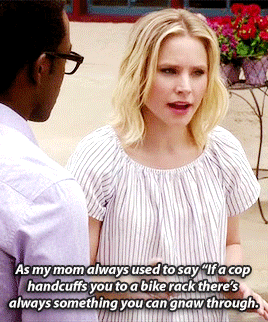
This isn’t relevant to my point, I just really wanted to include it
Lastly: I mentioned last week that I’m a little down on twist-driven storytelling as a concept or approach, but part of the reason it works so well here is that by going to the team-up so early — despite, as Adam said, having the feel of mid-season significance — the show is telling us it’s not “really” about the twist. Whereas something like Westworld builds really slowly and deliberately to a revelation that’s supposed to be earth-shattering, here the twist seems to be a means to a character-driven end, rather than the end in itself.
We’ll try to keep this up all season!
Facebook | Twitter
#The Good Place#Dance Dance Resolution#Eleanor Shellstrop#The Good Place season 2#ethics#Ted Danson#Michael#Kristen Bell#TV#reaction#Miri#Kris#Philosokris#(thanks Ron)#guest reactors#Adam
5 notes
·
View notes